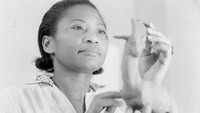At ANTIQUES ROADSHOW’s April 2018 visit to the Philbrook Museum in Tulsa, Oklahoma, a guest named Vicki brought in a diary, ca. 1865, which she said she had purchased 15 years ago at an estate auction for five dollars. Books & Manuscripts appraiser Ken Gloss determined that the original owner of the diary, an abolitionist named Warren, had been moving through the southern states towards the end of the Civil War, "maybe even during parts of the war as the Union advanced.”
The diary includes profiles of black people whom Warren had met, illustrating the conditions of slavery after the war through firsthand accounts. He records that one man he met, Benjamin Montgomery, was owned by Joe Davis, the older brother of Jefferson Davis, who was president of the Confederate States of America from 1862–1865. Montgomery had been taught to read, write, and practice religion, and some of Davis's white neighbors had objected to such "liberal" practices.
The diary also contains sketches of many things that Warren observed during his travels. Commenting on what one of the illustrations references, Gloss said:
"So, he must have gone through Savannah, where the slave markets were. And he was showing just an illustration of where they were holding the slaves before they were auctioning them."
The address on the diary, 28 Cornhill in Boston, was from 1842 to 1869 the location of the Boston branch of The American Tract Society, an evangelical organization dedicated to publishing and distributing Christian literature.
"...they had a publishing company in Boston called The American Tract Society. They did religious publications. But just before the war started there was a split within their organization. There was the side that was for anti-slavery, abolition and very fervently. And there was the group that wasn’t.”
In 1859, the Boston branch split off from the New York branch when the latter refused to “condemn the sin of slavery.” The New York City branch considered such a condemnation too divisive for its readership, which included Evangelicals in the South as well as the North. In 1878, the two branches rejoined under one organization, The American Tract Society.
Because of the detailed content and historical references in the diary, Gloss estimated the value of the diary at between $3,000 and $5,000.
Read an excerpt from the diary below.
Abolitionist Diary Excerpt, 1865
Page 35 — Left Side
...with us — a S. Carolinian … from the South — agt of the Society of Friends, Rev. J. H. Douglas, Wilmington — so Hill resides at Minneapolis Capt. Anton in charge of Jeff’s mansion — two Misses Hill, & Miss Hill — Benj. T. Montgomery Agent & machinist for Joe Davis attended this machinery. Joe is at Vicksburgh — has promised to lease the land for 1/3 the proceeds. [Jh]. has accepted it & proposes to release it […] could keep [accounts] — sold from […] because I could read — Joe did not oppose [Education]. His wife taught me figures addition — I [went] the rest my-self [in] mechanism. I [learned] geometry of… — He was the most liberal slaveholder I ever knew — Left Va. When 14 yrs old — sold in Natchez —
Page 35 — Right Side
Then in 1835 sold again to Joe D. for $1235. My wife was born here — I am 46 — 4 children 2 girls in Cincinnati at school — Joe left in April 1862. He carried his slaves to [...] They left him 120 in one night. He had 350 slaves at the breaking out of the war — He never interfered in religion — let them hold meetings as much as they pleased — the neighbors were opposed to this liberality. Jeff was a more passionate man. Joe had no children by his wife. Reported 3 children — The people are doing pretty well. Have organized in companies to take land — 2 men had 100 bales the white man wanted to sell both — They were going to V. to complain — John & Barney Davis —
Tuesday Nov 14. The fog was so dense last night that
Page 36 — Left Side
the boat was obliged to stop & ‘tie up’ for the night. This morning we started & reached Vicksburg in time for breakfast. The night was very uncomfortable —
Called at the P.O. and got a letter from Stanley. Visit to Mr. Hawley at the Bureau. In the P.M. went in an ambulance the visit the fortifications. Went to the place of […] Mr. Hawley talks of taking the Bank to my agency — Embarked at 5 o'clock on the "Margarite" for Natchez Rev. Mr. Rutherford on board
Page 36 — Right Side
Wrote to Broughton & Stanley — Wednesday Nov 15. 1865 Reached Natchez at 12 o’clock. Called at Freedman’s Bureau […] — Maj. [Rev S.G.] Knight. Has the dengue — Rev Mr. Sitts said the Primer is a model book. [Rev Ges. Hitchet] — Evening — singing & playing songs ------------ Thursday Nov 16. Looked out at Waterloo — Port Hudson Ruined sugar plantations of winter & Barrow — Flock of pelicans app. A.G. Powell’s – Baton Rouge — State house burned — Blind […] Rolling cotton [down its banks] — Ruined sugar houses. Burnt willows hundred guerrillas – Plaquemine. Bananas — Beautiful plantations near the River […]














